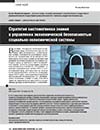Strategy of Knowledge Systemogenesis in Managing Economic Security of the Socio-Economic System
DOI: 10.33917/es-1.167.2020.136-143
The article presents a new vision for solving the problem of managing economic security of the socio-economic system in the context of a developing knowledge economy through the strategy of systemogenesis for labor activity knowledge. The strategy of knowledge systemogenesis allows to see the labor activity of the socio-economic system holistically, taking into account possible alternatives and evaluating these alternatives in the context of formalized systems and subsystems of subjects’ labor actions. The strategy is focused on maximizing utility of the consumed knowledge of labor actions in the face of an ever-increasing amount of knowledge and differentiating its quality in the sense of utility. This allows to manage the economic security of socio-economic system by optimizing the total and marginal utility of the knowledge consumed in your own systems and in competing with respect to the subject of management ones, as well as to protect own interests in a developing knowledge economy from the control effects of competing management entities
References:
|
1. Ukaz Prezidenta Rossiiskoi Federatsii ot 13 maya 2017 g. N 208 “O Strategii ekonomicheskoi bezopasnosti Rossiiskoi Federatsii na period do 2030 goda” [Decree of the President of the Russian Federation of May 13, 2017 No. 208 “On the Strategy for Economic Security of the Russian Federation for the Period Until 2030”]. Kremlin.ru, available at: http://kremlin.ru/acts/bank/41921. 2. Annenkov I.S. Postroenie sistemy upravleniya znaniyami v sovremennykh predprinimatel’skikh strukturakh [Building a Knowledge Management System in Modern Business Structures]. Avtoref. dis. … kand. ekon. nauk: 08.00.05. Volgograd, 2014, 20 p. 3. Nonaka I., Takeuchi Kh. Kompaniya — sozdatel’ znaniya: zarozhdenie i razvitie innovatsii v yaponskikh firmakh [The Company — Creator of Knowledge: Innovations Emergence and Development in Japanese Firms]. Moscow, ZAO “Olimp-Biznes”, 2011, 366 p. 4. Pogorelova E.V. Teoreticheskie i metodologicheskie osnovy upravleniya znaniyami v organizatsii [Theoretical and Methodological Foundations of Knowledge Management in Organization]. Avtoref. dis. … d-ra ekon. nauk: 08.00.05. Samara, 2011, 48 p. 5. Tel’nov Yu.F. Komponentnaya metodologiya reinzhiniringa biznes-protsessov na osnove upravleniya znaniyami [Component-Based Methodology for Business Process Reengineering Based on Knowledge Management]. Avtoref. dis. … d-ra ekon. nauk: 08.00.13. Moscow, 2003, 47 p. 6. Ahmad N., Saeed M., Zaman L., Naseem I. Knowledge management: a gateway for organizational performance. Journal of the knowledge economy, 2017, vol. 8, iss. 3, pp. 859–876. DOI: 10.1007/s13132-015-0282-3. 7. Nguyen T., Ngo L., Northey G., Siaw C. Realising the value of knowledge resources and capabilities: an empirical study. Journal of Knowledge Management, 2019, vol. 23, iss. 2, pp. 374–395. DOI: 10.1108/JKM-09-2016-0372. 8. Bakulin A.A. Razvitie sistemy upravleniya znaniyami v protsesse innovatsionnoi deyatel’nosti promyshlennykh organizatsii [Developing a Knowledge Management System in the Process of Industrial Organizations’ Innovative Activity]. Avtoref. dis. … kand. ekon. nauk: 08.00.05. Moscow, 2015, 24 p. 9. Belanov I.S. Tekhnologii upravleniya znaniyami v innovatsionnoi organizatsii [Knowledge Management Technology in an Innovative Organization]. Avtoref. dis. … kand. ekon. nauk: 08.00.05. Moscow, 2017, 27 p. 10. Ba Le Р., Lei H. Determinants of innovation capability: the roles of transformational leadership, knowledge sharing and perceived organizational support. Journal of Knowledge Management, 2019, vol. 23, iss. 3, pp. 527–547. DOI: 10.1108/JKM-09-2018-0568. 11. Che T., Wu Z., Wang Y., Yang R. Impacts of knowledge sourcing on employee innovation: the moderating effect of information transparency. Journal of knowledge management, 2019, vol. 23, iss. 2, pp. 221–239. DOI: 10.1108/JKM-11-2017-0554. 12. Sharkie R. Knowledge creation and its place in the development of sustainable competitive advantage. Journal of Knowledge Management, 2003, vol. 7, iss. 1, pp. 20–31. DOI: 10.1108/13673270310463590. 13. Tsai S. Innovative behaviour of knowledge workers and social exchange attributes of financial incentive: implications for knowledge management. Journal of knowledge management, 2018, vol. 22, iss. 8, pp. 1712–1735. DOI: 10.1108/JKM-07-2017-0293. 14. Altukhova N.F. Sistemy upravleniya korporativnymi znaniyami i metodika ikh postroeniya [Corporate Knowledge Management Systems and Methodology of Their Execution]. Moscow, ITs GUU, 2006, 107 p. 15. Okorokov I.V. Razvitie metodov upravleniya znaniyami kak faktor povysheniya kachestva intellektual’nogo kapitala predpriyatiya [Development of Knowledge Management Methods as a Factor of Improving the Quality of an Enterprise’s Intellectual Capital]. Avtoref. dis. … kand. ekon. nauk: 08.00.05. Moscow, 2013, 26 p. 16. Teslinova E.A. Razrabotka metodiki formirovaniya sistemy upravleniya znaniyami v avtomatizirovannoi informatsionnoi srede organizatsii: na primere ERP-sistemy [Development of a Methodology for the Formation of a Knowledge Management System in an Automated Information Environment of an Organization: by the Example of an ERP System]. Avtoref. dis. … kand. ekon. nauk: 08.00.13. Moscow, 2007, 18 p. 17. Usai A., Pironti M., Mital M., Mejri C.A. Knowledge discovery out of text data: a systematic review via text mining. Journal of knowledge management, 2018, vol. 22, iss. 7, pp. 1471–1488. DOI: 10.1108/JKM-11-2017-0517. 18. Komarova A.V. Formirovanie sistemy proektno-orientirovannogo upravleniya znaniyami [Establishing a Project-Oriented Knowledge Management System]. Moscow, Kreativnaya ekonomika, 2012, 186 p. 19. Archer-Brown C., Kietzmann J. Strategic knowledge management and enterprise social media. Journal of knowledge management, 2018, vol. 22, iss. 6, pp. 1288–1309. DOI: 10.1108/JKM-08-2017-0359. 20. Christensen P.H., Pedersen T. The dual influences of proximity on knowledge sharing. Journal of knowledge management, 2018, vol. 22, iss. 8, pp. 1782–1802. DOI: 10.1108/JKM-03-2018-0211. 21. Denford J.S., Ferriss A. Absorption, combination and desorption: knowledge-oriented boundary spanning capacities. Journal of knowledge management, 2018, vol. 22, iss. 7, pp. 1425–1441. DOI: 10.1108/JKM-08-2017-0325. 22. Ramachandran I. Triggering absorptive capacity in organizations: CEO succession as a knowledge enabler. Journal of knowledge management, 2018, vol. 22, iss. 8, pp. 1844–1864. DOI: 10.1108/JKM-03-2018-0192. 23. Anokhin P.K. Izbrannye trudy: Kibernetika funktsional’nykh system [Selected Works: Cybernetics of Functional Systems]. Moscow, Meditsina, 1998, 400 p. |



